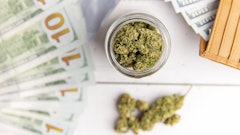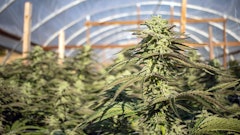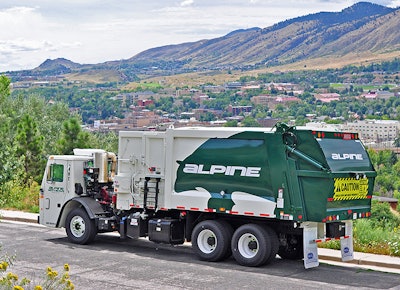
Top image courtesy of Alpine Waste & Recycle
It may be surprising to learn that a state considered as environmentally conscious as Colorado is lacking when it comes to diverting waste from landfills. In 2016, Colorado’s waste diversion rate was only 19 percent—well below the national average of 35 percent. In August 2017, the Colorado Solid and Hazardous Waste Commission approved statewide waste diversion goals, aiming to increase the amount of waste diverted from landfills by recycling and composting over the next 20 years. The new goals challenge Colorado to meet the national average for waste diversion by 2026 and to match the current diversion rate of the best-performing states—around 45 percent—by 2036.
Even more surprising might be how well the cannabis industry is doing overall in this effort when compared to other industries, such as the food and fashion industries. But cannabis industry leaders in Colorado are striving to be better even as they deal with a patchwork of regulations from the municipal to the state level. Recently a group of cannabis industry stakeholders, including license holders, NGOs and regulators, convened in advance of the Cannabis Sustainability Symposium that will be held Oct. 17-18, to discuss issues affecting industry progress such as waste control, packaging regulations and composting/recycling both plant and packaging materials. Amy Andrle of L’Eagle, Janet Burgesser of Denver Department of Environmental Health, Certifiably Green Denver, and Laurie Johnson, Executive Director, Colorado Association for Recycling (CAFR), led the group through a discussion on challenges and obstacles specific to waste in the cannabis industry, and to map a path forward.
While a lot of attention is given to pricey energy and water reduction technologies to increase sustainability, diverting waste from the landfill is a relatively affordable way to decrease a cannabis company’s carbon footprint. And as the popularity of marijuana increases throughout the country, as well as its legalization, many states are looking at Colorado for guidance on how to get it done, while Centennial State cannabis producers are looking to make their product more sustainable from seed to sale and beyond.
“We’re growing plants in topsoil and other mediums—these are the types of items that can very easily be composted,” Andrle said. “And then we also have a lot of plastics in our packaging, and those items should be recyclable.”
The role that regulation plays in determining environmental guidelines for the marijuana industry is one that cannot be overlooked, according to stakeholders at the roundtable. Frequent additions and changes in regulations within the cannabis industry are not a rare occurrence; but, as much as companies welcome additional clarity in current rules, new laws and codes can impede business growth in certain instances. Especially when those codes differ between municipal and state laws.
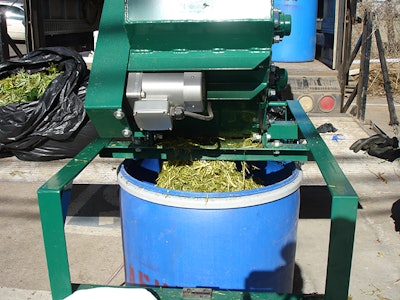
Photo courtesy of Kind ReDesigned
One of the more difficult hurdles that cannabis industry pioneers face is securing regulatory approval for the advancement of industry innovation. New processes (like Kind ReDesigned's Bokashi fermentation waste disposal), new equipment (like Alpine Waste and Recycling's compactor), and new technologies (like Sesh Technologies Manufacturing's rosin press) often require changes to current regulation and/or the development of new legislation. Engaging with regulatory bodies and other industry influencers to improve the legislative environment is critical to success. Outreach is often characterized in bursts of starts and stops. Educating regulators and local officials who are not science or technology oriented can be especially challenging.
Within the industry’s current codes, packaging must be child-resistant, resealable and stamped with labels indicating that the product is up-to-date and compliant with requirements. And though some products on today’s market are packaged in recyclable materials, it is still not a requirement. The fact is, edibles producers noted that they must deliver their product in packaging that is twice the size necessary for the product in order to accommodate labeling requirements and regulations.
What’s more, as with many industries involving the shipping of products, origin suppliers often use a large amount of extra material to ensure that items remain in good condition during transit, and for some manufacturers, the amount of labor necessary to begin and maintain a process for recycling this material is so resource-intensive it impedes implementation. Some cultivators said that even with a recycling program, limitations within the marketplace affect their ability to recycle—how some materials are sent to cultivators, for instance, is a challenge, sustainably speaking.
Waste and recycling companies, such as Alpine Waste & Recycling, are recognizing the concerns of cannabis producers, processors and retailers, and are working to accommodate for them. “One of our recent innovations,” said Grant Parsons of Alpine Waste & Recycling, “is our scaled trucks, which weigh exactly what we are picking up at each site. This information, while confidential to our client companies, is inputted into our monthly sustainability report which then measures how much trash was generated, and how much was able to be composted and recycled.”
This type of monitoring means each Alpine client can have a metric of their monthly waste to measure exactly how much they are recycling, composting and sending to landfills. Additionally, the technology allows for industry sectors to be rated against one another.
For waste and recycling companies, education is the key component in lessening the cannabis industry’s effect on the environment. For instance, learning that compacting plant materials with the required 50/50 mix is an option—instead of simply shredding the plant materials with something like a wood chipper, which can be a hazard to employees—is a vital piece of information that companies can use to improve landfill diversion rates and jump start recycling programs.
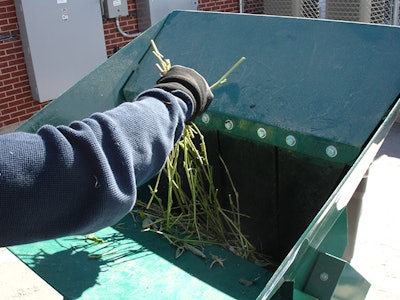
Photo courtesy of Kind ReDesigned
“We are looking, as an industry, at ways to amend how we can more effectively repurpose plant byproduct,” said Kristi Kelly, executive director of Marijuana Industry Group. “We are generating millions of pounds of green waste across the country, so there is a huge appetite for us to figure out how to resolve all of this plant waste and compost it correctly.”
Sectors such as the food industry already have measures and qualifications in place for handling waste; and while the cannabis industry is eager to glean information from these more established codes, marijuana companies are exercising caution in how closely they replicate other models. “We need to be careful not to imitate exactly what these other industries are doing—we need to remain innovative to support the industry, especially given the challenges associated with the industry,” Burgesser said.
The cannabis industry will continue the conversation about waste solutions at The Cannabis Sustainability Symposium in Denver on Oct. 17-18. For more information, visit www.cannabissustainability.org.

Shawna McGregor is senior vice president of The Rosen Group, a public relations agency based in New York City. She opened the Denver office in 2012. McGregor manages communications for leading cannabis brands, including cultivators, dispensaries, infused products producers and industry associations.
Photo courtesy of Shawna McGregor





















